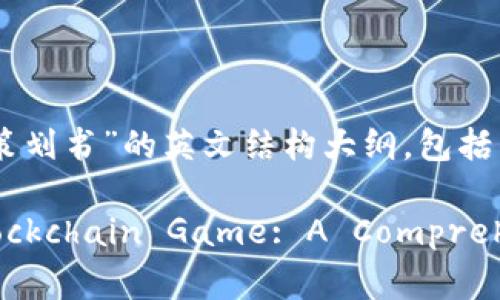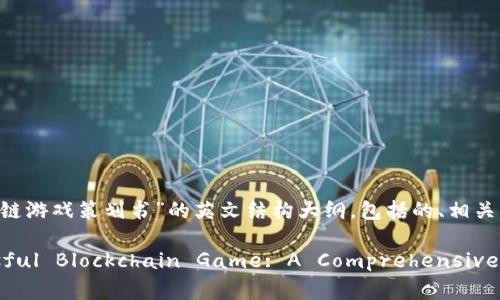以下是一个关于“区块链游戏策划书”的英文结
- By tpwallet官网入口
- 2025-04-09 09:20:19
Blockchain games are a revolutionary blend of traditional gaming and decentralized technology, providing players with ownership of in-game assets through unique identifiers known as NFTs (Non-Fungible Tokens). This innovation allows for true ownership and the ability to trade assets externally, which has transformed the gaming landscape.
The importance of blockchain in gaming cannot be understated. Players are no longer mere participants; they can now invest in their gameplay experience and potentially earn money through their efforts. This shift has attracted a new demographic of gamers, investors, and technologists who see the potential for profitability and creativity in blockchain games.
#### 2. Market Research and AnalysisBefore diving into game development, conducting thorough market research is essential. This involves analyzing current trends in both the gaming and blockchain sectors. As of 2023, games that incorporate Play-to-Earn (P2E) mechanics have surged in popularity, allowing players to earn cryptocurrency as they play.
Identifying your target audience is another critical step. This includes understanding their gaming preferences, spending habits, and engagement with blockchain technology. Competitor analysis is equally important; evaluate successful blockchain games to glean insights on effective game mechanics and monetization strategies.
#### 3. Game Concept DevelopmentCreating a compelling game concept is the foundation of a successful blockchain game. This includes establishing unique game mechanics, visual aesthetics, and the storyline. Blockchain technology should enhance the gaming experience, not overshadow it. Think about how smart contracts can facilitate in-game transactions seamlessly.
Monetization remains a key focus. Options might include the sale of unique in-game assets, subscription models, or even tokenized governance systems where players can vote on game development decisions. It’s essential to find a balance between profitability and player satisfaction.
#### 4. Technology StackChoosing the right technology stack is crucial for developing a blockchain game. Options include Ethereum for its robust smart contract capabilities, Binance Smart Chain for lower fees, or even new chains like Flow, built specifically for games. Each platform has its pros and cons related to transaction speed, cost, and community support.
Implementing smart contracts efficiently is vital. These contracts will manage in-game transactions, asset ownership, and player interactions on the blockchain. A strong front-end design enhances user engagement and accessibility, making sure players can easily navigate the game.
#### 5. Game Development ProcessThe game development process typically starts with assembling a skilled team. This includes game designers, developers, artists, and marketing experts. Establishing a realistic timeline with clear milestones will assist in keeping the project on track.
During development, it’s crucial to engage in continuous testing to ensure the game is fun, functional, and free of bugs. Consider engaging beta testers from your community to gather feedback and make improvements before the official launch.
#### 6. Marketing and Community BuildingBuilding a community around your game is arguably as important as the game itself. Players invested in your ecosystem will create a loyal user base and spread the word. Utilize social media platforms, Discord servers, and gaming forums to foster discussions and interact with potential players.
Effective marketing strategies might include influencer partnerships, targeted advertisements, and promotions. Consider creating engaging content that highlights the unique facets of your game and showcases player experiences to attract attention.
#### 7. Legal ConsiderationsThe incorporation of blockchain and cryptocurrencies brings legal considerations that must be addressed. Understanding the regulatory environment regarding digital currencies and in-game transactions is paramount to avoiding legal issues later on.
More so, safeguarding intellectual property rights by registering trademarks and copyrights on your game’s assets ensures that your creativity is protected. Compliance with relevant laws is non-negotiable and should involve consulting with legal professionals specializing in tech and gaming law.
#### 8. Future of Blockchain GamingThe future of blockchain gaming looks promising, with increasing integration of advanced technologies like VR and AR, further enhancing the player experience. Predictions indicate a massive growth in user engagement and market size, particularly as traditional gaming companies begin to incorporate blockchain elements.
Emerging technologies may lead to new forms of gameplay and player interaction, making it essential for developers to stay ahead of trends. The long-term impact of blockchain could redefine the gaming industry, moving toward a model of greater player autonomy and financial investment.
### Questions to Explore 1. What unique features make blockchain games appealing to players? 2. How do you effectively monetize a blockchain game? 3. What are the technical challenges involved in developing a blockchain game? 4. How important is community engagement in the success of a blockchain game? 5. What legal hurdles do developers encounter in blockchain gaming? 6. How can developers ensure their blockchain game remains relevant over time? Each question can be addressed with a detailed analysis, providing valuable insights for developers, investors, and players alike, enabling them to navigate the evolving landscape of blockchain gaming.




